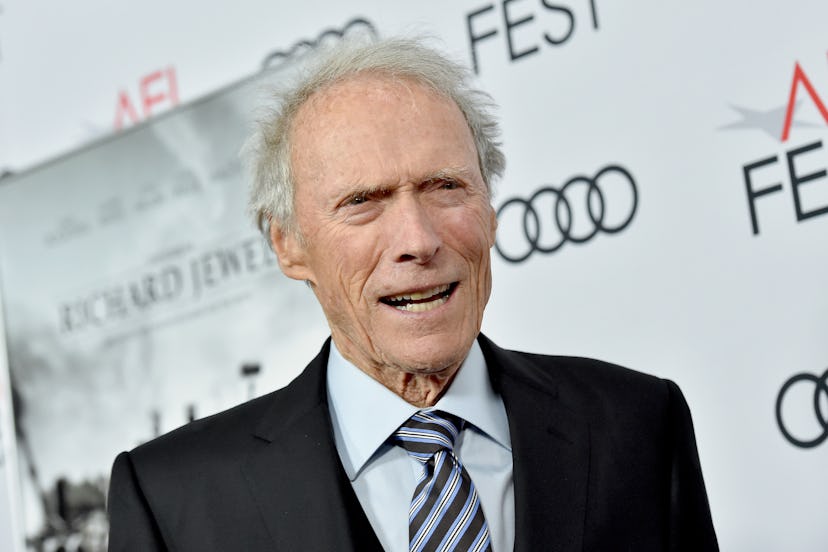Clint Eastwood’s Richard Jewell Faces Criticism For Insinuating a Female Journalist Slept with Her Sources

“I don’t care if my reporters are fucking elephants, as long as they aren’t covering the circus.”
The adage, often attributed to the late New York Times executive editor A.M. Rosenthal, is a rough way of explaining one of the more indiscreet golden rules of journalism: reporters shouldn’t sleep with their sources.
Yet, as The Atlantic pointed out in 2015, Hollywood has a long, long history, even perhaps an obsession, of portraying female journalists proverbially… well, fucking the elephant.
Whether it’s devious reporters willing to use sex to get a scoop (see: House of Cards‘ Janine Skorsky, who admitted she’d “suck, screw, and jerk anything that moved just to get a story”) or less Machiavellian but still lazy and concerning portrayals (see: the old romantic comedy trope of a female journalist earnestly falling in love with a subject à la Never Been Kissed, Trainwreck, How To Loose a Guy in 10 Days, Perfect, and so many, many more), Hollywood cannot seem to fathom that a female reporter can be trusted to keep her professional life and her private life separate.
Which is why Clint Eastwood‘s upcoming flick Richard Jewell appears to be the final straw for so many.
Eastwood’s film not only implies that a journalist sleeps with her sources, but it attributes the behavior to an actual female journalist, the late Kathy Scruggs, with absolutely new evidence.
It has exploded into a very public volley involving the film’s studio Warner Brother, actress Olivia Wilde (who portrays Scruggs), The Atlanta Journal-Constitution, and Twitter at large.
Eastwood’s movie dramatizes the case of Richard Jewell, a security guard who helped to save lives and minimize the impact of the Centennial Olympic Park bombing during the 1996 Summer Olympics in Atlanta.
However, after Jewell was originally heralded as a hero, public opinion turned when it was revealed that the FBI considered the man as the lead suspect in the attack.
Jewell was subjected to weeks of harsh media scrutiny before he was eventually cleared and recognized once again as a hero (and a victim of the media circus).
In 1997, rightwing domestic terrorist Eric Rudolph was eventually arrested and then convicted on charges related to both the Olympic bombing and a string of others, including attacks on an abortion clinic and a lesbian nightclub.
Scruggs, remembered as an adept reporter with multiple sources in law enforcement by her colleagues at the AJC, was the first to publish the information that Jewell was considered a suspect. In the years since, there’s never been any accusations, evidence, or insinuation that she slept with any of her sources. If anything, Scruggs’s case might be more apt to talk about the gatekeeper role of journalism than it is Rosenthal’s “Elephant rule.”
Yet, when the current staff at AJC got wind that Eastwood had rewritten history about their late colleague, the paper fired back.
“Perpetuating false tropes about female reporters and journalism itself shouldn’t go unchallenged in a time when our profession finds itself under almost constant attack,” AJC editor Kevin G. Riley told IndieWire.
A lawyer for the paper also sent a strongly worded letter to Warner Brothers.
“It is obvious that nobody associated with the film was actually interested in obtaining the accurate facts from my clients since you completely disregarded the information that was provided when my client’s representatives met with the film makers and the former AJC editor who was Ms. Scruggs’ boss provided relevant feedback about how the AJC broke the story and who Ms. Scruggs was as a person and as a reporter,” reads the letter, according to Deadline.
The AJC has demanded that Warner Brothers clarify that parts of the film have been dramatized, and has asked for a disclaimer be added to the film as well.
Warner Brothers, however, has hit back, first clarifying that the idea of Scruggs sleeping with an FBI agent to get the scoop was more implied than stated in the film. They then went after AJC itself.
“It is unfortunate and the ultimate irony that The Atlanta Journal-Constitution, having been a part of the rush to judgment of Richard Jewell, is now trying to malign our filmmakers and cast,” read a statement from the studio. “Richard Jewell focuses on the real victim, seeks to tell his story, confirm his innocence and restore his name.”
(Warner Brother is owned by the same parent company as CNN. CNN reached a legal settlement with Richard Jewell in 1997, but maintained at the time that its own reporting on the matter was fair and balanced. Though, last week a CNN producer publicly aired misgivings about the network’s handling of the case).
Wilde, meanwhile, has chimed in as well.
“What I resented was this character being boiled down to one inferred scene and I don’t hear anyone complaining about Jon Hamm’s [FBI agent] character as being inferred that he also had a relationship with a reporter. It feels unfair that Kathy has been minimized in this way,” she told Deadline.
“If there’s anything slightly questionable about a female character, we often use that in relation to condemn that character or to condemn the project for allowing for a woman to be impure in a way. It’s a misunderstanding of feminism to assume that all women have to be sexless. I resent the character being minimized to that point,” she continued.
Wilde does not account for either Hollywood’s troubling history with portraying female journalists, nor the fact that the insinuation is not based on fact.
For a major studio, wide-release film about the media’s rushed to judgement about an innocent person, it certainly seems to be an “ultimate irony” of it’s own that no one involved seems to be taking any responsibility for the fact it accuses, without any evidence, a dead woman of committing a serious ethical lapse.